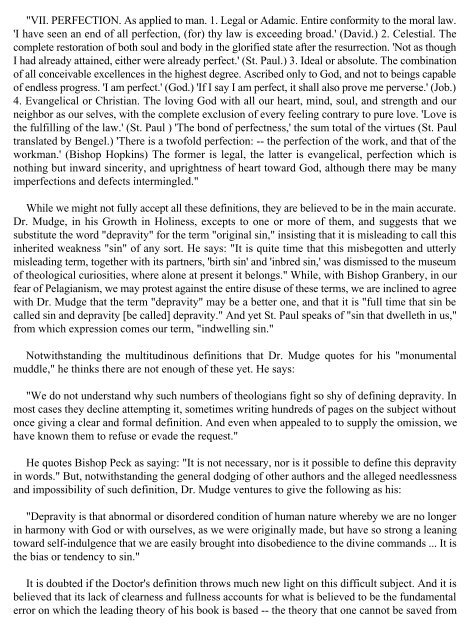Scriptural Sanctification - Media Sabda Org
Scriptural Sanctification - Media Sabda Org
Scriptural Sanctification - Media Sabda Org
You also want an ePaper? Increase the reach of your titles
YUMPU automatically turns print PDFs into web optimized ePapers that Google loves.
"VII. PERFECTION. As applied to man. 1. Legal or Adamic. Entire conformity to the moral law.<br />
'I have seen an end of all perfection, (for) thy law is exceeding broad.' (David.) 2. Celestial. The<br />
complete restoration of both soul and body in the glorified state after the resurrection. 'Not as though<br />
I had already attained, either were already perfect.' (St. Paul.) 3. Ideal or absolute. The combination<br />
of all conceivable excellences in the highest degree. Ascribed only to God, and not to beings capable<br />
of endless progress. 'I am perfect.' (God.) 'If I say I am perfect, it shall also prove me perverse.' (Job.)<br />
4. Evangelical or Christian. The loving God with all our heart, mind, soul, and strength and our<br />
neighbor as our selves, with the complete exclusion of every feeling contrary to pure love. 'Love is<br />
the fulfilling of the law.' (St. Paul ) 'The bond of perfectness,' the sum total of the virtues (St. Paul<br />
translated by Bengel.) 'There is a twofold perfection: -- the perfection of the work, and that of the<br />
workman.' (Bishop Hopkins) The former is legal, the latter is evangelical, perfection which is<br />
nothing but inward sincerity, and uprightness of heart toward God, although there may be many<br />
imperfections and defects intermingled."<br />
While we might not fully accept all these definitions, they are believed to be in the main accurate.<br />
Dr. Mudge, in his Growth in Holiness, excepts to one or more of them, and suggests that we<br />
substitute the word "depravity" for the term "original sin," insisting that it is misleading to call this<br />
inherited weakness "sin" of any sort. He says: "It is quite time that this misbegotten and utterly<br />
misleading term, together with its partners, 'birth sin' and 'inbred sin,' was dismissed to the museum<br />
of theological curiosities, where alone at present it belongs." While, with Bishop Granbery, in our<br />
fear of Pelagianism, we may protest against the entire disuse of these terms, we are inclined to agree<br />
with Dr. Mudge that the term "depravity" may be a better one, and that it is "full time that sin be<br />
called sin and depravity [be called] depravity." And yet St. Paul speaks of "sin that dwelleth in us,"<br />
from which expression comes our term, "indwelling sin."<br />
Notwithstanding the multitudinous definitions that Dr. Mudge quotes for his "monumental<br />
muddle," he thinks there are not enough of these yet. He says:<br />
"We do not understand why such numbers of theologians fight so shy of defining depravity. In<br />
most cases they decline attempting it, sometimes writing hundreds of pages on the subject without<br />
once giving a clear and formal definition. And even when appealed to to supply the omission, we<br />
have known them to refuse or evade the request."<br />
He quotes Bishop Peck as saying: "It is not necessary, nor is it possible to define this depravity<br />
in words." But, notwithstanding the general dodging of other authors and the alleged needlessness<br />
and impossibility of such definition, Dr. Mudge ventures to give the following as his:<br />
"Depravity is that abnormal or disordered condition of human nature whereby we are no longer<br />
in harmony with God or with ourselves, as we were originally made, but have so strong a leaning<br />
toward self-indulgence that we are easily brought into disobedience to the divine commands ... It is<br />
the bias or tendency to sin."<br />
It is doubted if the Doctor's definition throws much new light on this difficult subject. And it is<br />
believed that its lack of clearness and fullness accounts for what is believed to be the fundamental<br />
error on which the leading theory of his book is based -- the theory that one cannot be saved from
















